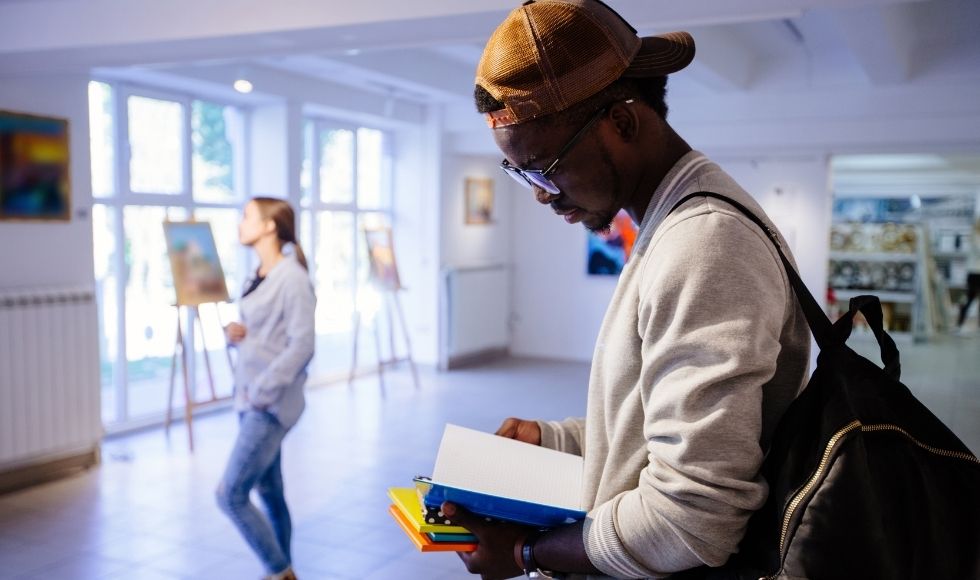School of the Arts introduces new iArts program in 2022

Focusing on social justice, accessibility and creative collaboration, the new iArts Bachelor of Fine Arts program will combine a wide range of creative practices, including visual art, theatre, film, and art history. (Shutterstock image)
McMaster’s School of the Arts (SOTA) is going to be teaching the arts a little differently starting in 2022.
In the fall 2022 semester, the school will launch the iArts (Integrated Arts) Bachelor of Fine Arts degree – a new program that aims to dismantle traditional divisions between forms of creative production like theatre, film and visual art.
The program, which centres accessibility, creative collaboration and interdisciplinary and cultural expressions, will allow students to develop their personal creative expression by exploring media, performance and techniques across many different areas of the arts, while also learning about artistic and creative history and critical contexts – all through a social justice lens.
“The conventions that have siloed our program areas isn’t really how artistic practice happens,” explains Stephanie Springgay, director of the School of the Arts. “Many faculty have an approach to their own practice that reflects that.”
“McMaster already emphasizes interdisciplinary learning, so the School of the Arts is well-positioned to deliver a program like this one.”
Central to the iArts program is a focus on social justice, as well as an expansion beyond traditional Western definitions of art and creativity.
“We’re trying to disrupt the norms of what’s traditional,” says Springgay. “We’re de-centring Western art, and using an anti-oppression lens towards art-making so it becomes more equitable and diverse in the creative practices that students are exposed to.”
With that in mind, the program specifically welcomes students from equity-seeking communities, and has formally opened up the conventional portfolio/audition process to a much wider range of forms of creative expression, including spoken-word poetry, graffiti and video production.
“High schools tend to compartmentalize the arts, and there’s a huge disparity in high school programs in terms of who gets access to the arts,” explains Carmela Laganse, a studio art professor who, along with theatre and film professor Peter Cockett, helped develop the program.
“But outside of school, students are creating: They’re doing pottery, they’re producing music videos, they’re on TikTok. We want to give opportunities to people who are creative but haven’t gone through the traditional arts path.”
Making the program more accessible to traditionally underrepresented groups also means investing in targeted outreach, so SOTA has hired Sahra Soudi, a Humanities graduate and the founder of Black Lives Matter Hamilton, to do community consultations and arts-based workshops designed to de-mystify the iArts application process.
“We recognize that SOTA hasn’t been in the best position to bring in a diverse community, so we’re working to fix that,” says Springgay. “Sahra is working to build bridges between underrepresented communities in Hamilton and the School of the Arts.”
That focus on inclusion was a part of the program even from its early days of development, says Cockett.
“By committing to social justice and decolonizing our curriculum, we aligned ourselves to a future that’s now happened. Those principles were pointing us forward.”
Ultimately, the aim of the program, which supports the exploration of interdisciplinary skills in all kinds of creative production, is to continue to build and develop innovative approaches to art and social practice.
Students will also develop important transferable skills, Laganse points out.
“The job market is changing,” she says. “Employers are shifting towards creativity and collaboration, and are looking for people who can demonstrate lateral, creative thinking.”
iArts will start with a 40-student cohort next fall.
“What I love about the program is that it’s designed with the students in mind – it’s not just words on a paper,” says Laganse.
“Our principles aren’t just trite statements designed to appease: they’re proactive ideas which are the result of ground-up thinking. Education has evolved, and we’re thinking about how to make it relevant and effective.”

